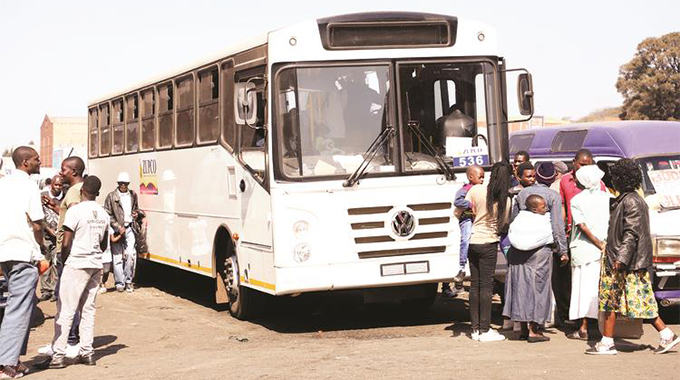Time to perfect the Zupco model

Phillipa Mukome-Chinhoi Features Correspondent
Government’s decision to introduce a subsidised urban mass transport system has brought relief to commuters burdened by prohibitive kombi fares in urban areas.
A lot still needs to be done to achieve sanity and convenience at pick-up points.
Commuters now pay between 50c and $1 for a trip into the city centre compared to fares ranging from $3 to $5 being charged by kombis.
However, apart from chaotic scenes witnessed at pick-up points everyday, the timetables for the buses are not fixed.
It was envisaged upon the introduction of the urban mass transport system that local authorities would build proper structures for specific suburbs, so that commuters can easily access buses.
According to media reports, Harare City Council announced new ranks for local and long-distance transporters and warned those who flout by-laws by picking and dropping passengers at undesignated points that they risk having their route permits withdrawn.
In a statement, City of Harare said council had developed a framework for inner city renewal, which was aimed at de-congesting the city and bringing order and sanity in the central business district.
In the implementation of the first phase of the framework, the City of Harare had resolved to embark on an intensive exercise to bring sanity in the CBD and other affected areas in light of the unprecedented levels of chaos prevailing in the city.
The use of holding bays designed to de-congest the city has not yet been done, hence, the confusion.
Commuters are losing their valuables everyday because of pressure to gain access to the buses.
According to the 2017 plans , all commuter omnibus operators using the Copacabana and Market Square termini, were to go to the Coventry Holding Bay with immediate effect where a proper control mechanism had been put in place to ensure the operationalisation of the bay.
All commuter omnibus operators, using Simon Vengai Muzenda (Fourth Street) and Charge Office termini were set to use the space opposite Rhodesville Police Station along Robert Mugabe Road as their holding bay.
It seems the holding bays are not being used because there is still congestion at bus terminuses.
A recent visit to the Charge Office Terminus around 6pm revealed that most buses have resorted to creating their own pick-up points because of space constraints.
There is now a pick-up point in front of Mahomed Mussa trading area, another one behind the shop along Kenneth Kaunda Avenue, and yet another one adjacent to TM Supermarket along Kenneth Kaunda Avenue. Right in front of the railway station there is another pick-up point, and another one close to ZESA premises near Eastgate.
Buses make a sudden U-turn in front of vehicles coming from Simon Vengai Muzenda Street causing a traffic jam along Kenneth Kaunda Avenue.
There is need to rehabilitate these ranks and build more, since there has been a population increase in the cities owing to rural to urban migration that has been on the increase in recent years.
According to the acting chief executive for the Zimbabwe United Passenger Company (Zupco), the firm will release 47 new buses this week, taking its fleet to 427 as the Government moves to lessen the burden on commuters.
The new buses where bought from South Africa and China and they will be commissioned soon.
Delivery of an additional 500 new buses from Belarus is also expected soon with a team that will assemble them already undergoing training.
The special arrangement for Berlarus to supply Zimbabwe with buses was agreed on during President Mnangagwa’s State visit to Minsk in January.
The Governments plan is to grow Zupco’s fleet to 3 000.
Zupco acting chief executive officer Evaristo Madangwa said they consult the council first before developing pick-up points.
“Remember cities are now congested with people themselves, private cars, kombis and buses as well, so we try by all means to pick up people from safe places, but close to the ranks” he said.
“As Zupco we also pay a certain fee so that we can also have access to these ranks, which belong to councils. Of course we consult each other whenever there is need for any development.”
Madangwa said in order to reduce the chaotic scenes at ranks they are trying to eliminate the use of cash on the buses. Commuters can now pay using prepaid cards.
“We are contemplating the use of ‘tap and go cards’, which can be bought from their point of sales using cash, swipe and EcoCash. The parastatal is pleased with commuters as they are now accepting all forms of payment, most particularly prepaid cards and other electronic payments,” he said.
In an interview with several commuters in Harare CBD, concern was raised over lack of proper timetables, and the chaotic scenes being witnessed in queues.
Jorum Masababe of Zengeza 3 in Chitungwiza, who lost his wallet, cellphone and power bank, lamented his loss of valuables, and blamed it on premeditated action by criminals masquerading as commuters.
“The commotion is being caused by these thieves, otherwise why all this pressure? Well meaning commuters stand in queues and await their turn,” Masababe said.
He added: “We appeal to the city fathers that they construct proper waiting shelters, so that our commuting lives are made easier.”







Comments